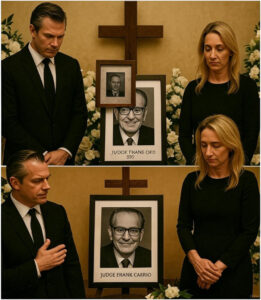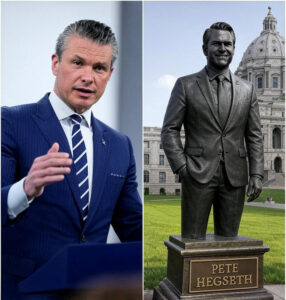A Bugle’s Last Note: The Day Silence Spoke Volumes
Under the solemn oaks of Arlington National Cemetery on October 3, 2025, the strains of “Taps” faded into the autumn air, marking not just another Veterans Day tribute but the unveiling of a promise kept. Sergeant James Carver, the soldier who surrendered his voice to a grenade’s fury in Fallujah two decades ago, had his story etched into eternity today. A coalition of veterans’ organizations, including the VFW, American Legion, and Wounded Warrior Project, alongside private donors, announced a $2.8 million commitment to erect a monument in his honor. This isn’t mere stone—it’s a testament to a man whose dictated letters from a hospital bed rallied a fractured nation, turning personal agony into a chorus of resilience. Carver, who passed in 2022 from complications of his injuries, left behind words that still pulse in America’s heart. As dignitaries laid wreaths, the question lingered: How does one capture a voice that never truly fell silent?


From Fallujah’s Flames to a Nation’s Conscience
James Carver enlisted in 1999, a lanky kid from rural Ohio with dreams of service bigger than his hometown. Deployed to Iraq in 2003, he led a squad through the labyrinthine streets of Fallujah, where insurgency turned every corner into a gamble. On November 12, that gamble ended in a deafening blast. Shrapnel tore through his throat, severing vocal cords and leaving him mute amid the rubble. Evacuated to Walter Reed, Carver faced not just physical reconstruction but the abyss of isolation. Yet, in those sterile rooms, he found his weapon anew: a notepad and a nurse’s borrowed laptop. Over months of therapy, he dictated letters—raw, unfiltered missives to his family, fellow soldiers, and eventually, the American public. “War doesn’t steal your voice,” he wrote in one, published in The New York Times in 2004. “It demands you find a louder one.” These words, transcribed by aides, ignited a firestorm, boosting enlistment and funding for veterans’ care during a divisive war.
Dictated Dreams: The Letters That Bridged Divides
Carver’s correspondence wasn’t poetry; it was grit wrapped in gratitude. One letter to his wife, Sarah, detailed the “ghost echoes” of explosions haunting his dreams, yet ended with a vow: “I’ll whisper home in ways words can’t touch.” Shared with permission after his recovery, it humanized the abstract toll of combat for millions. Another, addressed to President Bush, critiqued strategy without bitterness, urging “a war won in hearts, not just headlines.” These epistles crossed aisles—liberals praised their candor, conservatives their patriotism—fostering dialogues in op-ed pages and congressional hearings. By 2006, Carver’s voice (or lack thereof) had inspired the Silent Strength Act, allocating $500 million for traumatic injury research. He became a fixture at fundraisers, communicating via text-to-speech apps with a wry humor that disarmed audiences. “I’m the guy who talks without talking,” he’d quip, his eyes twinkling. His sacrifice wasn’t just physical; it was a bridge, pulling America from polarization toward shared purpose.
Rallying the Ranks: The Coalition’s $2.8 Million Vow
The monument fund, dubbed the Carver Echo, coalesced in early 2025 after a viral podcast revisited his letters amid rising veteran suicide rates. Led by VFW National Commander John Smith, the coalition pooled resources: $1.2 million from membership drives, $900,000 from corporate sponsors like Boeing and Lockheed Martin, and the rest from grassroots crowdfunding that hit $700,000 in weeks. “James didn’t just survive Fallujah; he rebuilt us,” Smith said at the Arlington event, his voice cracking. The design, unveiled digitally, features a bronze silhouette of Carver mid-stride, notepad in hand, encircled by etched excerpts from his writings. Set for groundbreaking in spring 2026 near the Iraq War Memorial, it will include an interactive audio station reciting his letters in his own digitized voice. Donors, from Gold Star families to tech moguls, see it as more than commemoration—a call to action. “In an era of noise,” one contributor noted, “Carver teaches us the power of the pause.”
Ripples of Resilience: Impact Beyond the Battlefield
Carver’s legacy extends far beyond proposed granite. His letters seeded support groups like Voiceless Veterans, now aiding 10,000 mute survivors annually with adaptive tech. In schools, excerpts appear in civics curricula, teaching empathy over enmity. Sarah Carver, now an advocate, recalls how James’s silence amplified their bond: “He listened twice as hard, loved three times deeper.” Posthumously, his influence waned not; a 2024 biopic, Whispers from the Wire, grossed $45 million, donating proceeds to the fund. Critics hail it for humanizing “the invisible wounds.” Yet, challenges persist—funding gaps for voice restoration lag, and PTSD stigma endures. The monument, proponents argue, will spotlight these, with inscribed plaques urging visitors: “Speak for those who can’t.” As construction bids roll in, the project stirs debate: Is $2.8 million enough for one man’s echo, or the spark for systemic change?
Stone and Soul: A Monument for the Ages
By dusk on this crisp October day, as families lingered at Arlington, the Carver Echo felt less like a endpoint and more a beginning. Veterans shared stories under the gathering clouds—tales of brothers saved by James’s words, of policies shifted by his pen. Architect Elena Ruiz, designing the site, envisions it as “a quiet amphitheater where silence invites reflection.” Scheduled for dedication on the 20th anniversary of Fallujah’s battle, it promises to draw pilgrims seeking solace in shared sacrifice. Sarah, flanked by their grown children, placed a single dog tag on the announcement podium: “He’d say it’s not about the stone—it’s about the stories it holds.” In a nation grappling with division, Carver’s silent roar reminds us: true warriors build bridges from brokenness. As the coalition’s pledge solidifies into blueprints, one truth endures—his voice, once lost, now carves canyons in our collective heart, eternal and unyielding.
Leave a Reply